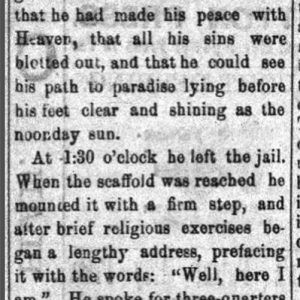calsfoundation@cals.org
Hayes White (Execution of)
Hayes White was an African American man hanged at Marion (Crittenden County) on June 10, 1881, for shooting the sheriff of Crittenden County to death.
Hayes White was arrested on April 20, 1881, for burglarizing a store in Crawfordsville (Crittenden County). Although he was unarmed when arrested, a friend apparently slipped him a pistol the next day, and he escaped after a shootout in which two lawmen were wounded. A deputy informed Sheriff W. F. Beattie in Marion, who rode to White’s cabin and, “upon entering the door…was fired on from within, the ball striking him in the mouth and he fell back dead.” The Osceola Times reported that the deputy “ran like a quarter horse, throwing his gun away and calling on someone in sight not to let Hays [sic] White kill him.”
White fled, and Governor Thomas Churchill raised the state reward for his capture from $200 to $500, which apparently led a posse from Forrest City (St. Francis County) to set out in search of him. They caught up with him in a cabin at Gregory’s Point on the White River about ten miles south of Augusta (Woodruff County). However, a newspaper reported, “while the stupid posse were standing about the cabin making inquiry of the murderer’s whereabouts, he…walked leisurely out of the cabin with a pistol in each hand and made good his escape to the bottoms.”
White was soon captured, though, and was returned to Marion on May 1. The Arkansas Gazette called for local residents to let justice follow its course, writing that “public sentiment, although strong against the murderer, will not permit the fair fame of the county to be blackened by the acts of a band of lynchers, and White will accordingly be hanged as the law directs.”
A jury of eight Black and four white men heard the case against White on May 3, 1881, and “the evidence was so convincing that the jury was absent but a few minutes before returning a verdict of ‘guilty.’” Two days later, he was sentenced to hang on June 10 and, when asked if he had anything to say, replied, “I am sorry I killed Sheriff Beattie; if I had known it was him I would not have done it.”
On the morning of June 10, 1881, the Arkansas Democrat reported, “a large crowd of colored people left Memphis this morning to witness the execution.” White slept well the night before and was interviewed that morning by a Democrat reporter who wrote that the condemned man was “detailing a series of startling adventures and bloody crimes, such as are never, or rarely, found outside of dime novel literature.” The killer said that he shot Beattie “acting in self-defense and under great excitement” and that he had “made his peace with Heaven, that all his sins were blotted out.”
White left the jail at 1:30 p.m., mounted the gallows “with a firm step,” and addressed a crowd of around 2,000 people, mostly Black, for around forty-five minutes “in a clear tone and without visible agitation.”
The trap door opened at 2:30 p.m., and White fell six or seven feet, then “struggled violently, dying miserably from strangulation.” His body was lowered after twenty minutes, and the Democrat reporter concluded “the execution was one of the most remarkable exhibitions of nerve on the part of the condemned ever witnessed in this or any other state.”
For additional information:
“A Bad Coon Coming.” Arkansas Democrat, April 28, 1881, p. 1.
“A Bad Nigger.” Southern Standard, April 23, 1881, p. 2.
“Captured and in Irons.” Southern Standard, April 30, 1881, p. 2.
“Criminal Notes.” Arkansas Gazette, May 4, 1881, p. 4.
“Gone to See Him Swing.” Arkansas Democrat, June 10, 1881, p. 1.
“Hayes White.” Arkansas Gazette, May 1, 1881, p. 1.
“Hung for Murder.” Arkansas Democrat, July 11, 1881, p. 4.
“Sentenced to Hang on the 10th of June.” Arkansas Gazette, May 6, 1881, p. 1.
“Will Hang.” Osceola Times, May 7, 1881, p. 1.
Mark K. Christ
Central Arkansas Library System
 Law
Law Post-Reconstruction through the Gilded Age, 1875 through 1900
Post-Reconstruction through the Gilded Age, 1875 through 1900 White Hayes (Execution of)
White Hayes (Execution of) 



Comments
No comments on this entry yet.